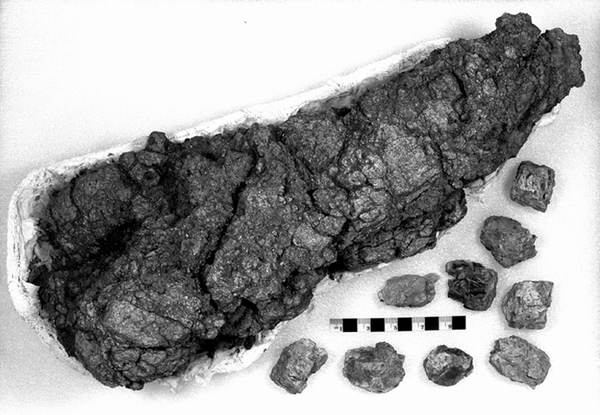
A king-sized theropod coprolite
- Select a language for the TTS:
- UK English Female
- UK English Male
- US English Female
- US English Male
- Australian Female
- Australian Male
- Language selected: (auto detect) - EN
Play all audios:

Fossil faeces (coprolites) provide unique trophic perspectives on ancient ecosystems. Yet, although thousands of coprolites have been discovered, specimens that can be unequivocally
attributed to carnivorous dinosaurs are almost unknown. A few fossil faeces have been ascribed to herbivorous dinosaurs1,2,3, but it is more difficult to identify coprolites produced by
theropods because other carnivorous taxa coexisted with dinosaurs and most faeces are taxonomically ambiguous. Thus sizeable (up to 20 cm long and 10 cm wide) phosphatic coprolites from
Belgium4 and India5,6 that have been attributed to dinosaurs might have been produced by contemporaneous crocodylians7 or fish. But there is no ambiguity about the theropod origin of the
Cretaceous coprolite we report here. This specimen is more than twice as large as any previously reported carnivore coprolite, and its great size and temporal and geographic context indicate
that it was produced by a tyrannosaur, most likely Tyrannosaurus rex. The specimen contains a high proportion (30–50%) of bone fragments, and is rare tangible evidence of theropod diet and
digestive processes.
We thank W. Sloboda for the discovery of the coprolite; the Allemand family for permitting access to the land and its fossils; H. N. Bryant, M. J. Jurashius, C. E. Meyer, M. Moreno, R. L.
Oscarson, J. F. Parham, D. Pierce, J. Rifkin and B. H. Tiffney for comments and technical assistance; the Royal Saskatchewan Museum, Stanford University, the US Geological Survey, and the
University of California at Santa Barbara for technical and administrative assistance; and the late W. V. Sliter for support and encouragement.
Present address: Biomechanical Engineering Division, Mechanical Engineering Department,
United States Geological Survey, 345 Middlefield Road, MS 975, Menlo Park, 94025, California, USA
Eastend Fossil Research Station, Royal Saskatchewan Museum, Box 460, Eastend, S0N 0T0, Saskatchewan, Canada
Department of Integrative Biology & Museums of Vertebrate Zoology and Paleontology, University of California, Berkeley, 94720, California, USA
Anyone you share the following link with will be able to read this content:
